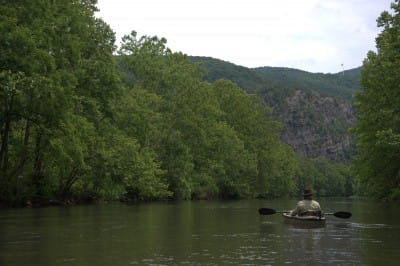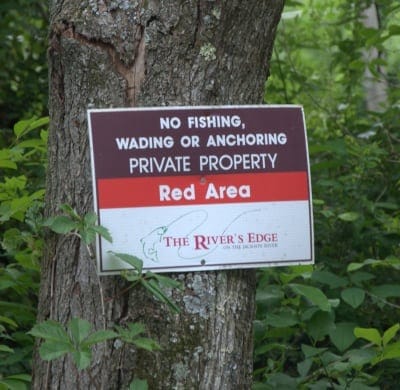
In Covington, Virginia, on June 5, 2012, Judge Malfourd Trumbo handed down his ruling of partial summary judgment in North South Development v Garden, in which plaintiffs sued two anglers for trespassing. Court documents filed by the plaintiffs (also the landowners in the case) argue that in June 2010, the anglers were fishing a section of the Jackson River that the landowners claim to own. Indeed, the landowners pay taxes on the river bottom and own or lease land on both sides of the river. They have also clearly posted the land with signs, visible from the river, which state that anglers may not fish or wade in that section of the river.
The defendants claim that they were on public property because they were standing in the middle of the river well below the high water mark and therefore paid little heed to the signs because they weren’t on dry land. Even more significant, the defendants note that the Virginia Department of Game and Inland Fisheries (VDGIF) signs at public put-ins along the river explicitly state that anglers may fish and wade in that section of the river.
Gary Martel, Deputy Director of Wildlife Resources with the Virginia Game and Inland Fisheries, said, “We are aware that signs are posted along portions of the Jackson River that we view as public and not private property. Anglers will not be cited by our Conservation Officers, however, as long as they have a legal fishing license and remain in the river.”
This may be cold comfort to the defendants in the North South Development v Garden case.
Virginia law states that navigable streambeds are public and open to Virginia citizens to enjoy, and that land not otherwise conveyed is the property of the state and held in trust for the public’s use and enjoyment. Nevertheless, usage issues are nothing new to the Jackson River. A 1996 case before the Virginia Supreme Court concerned two 18th-century grants from the Crown of England to private citizens; the grants had expressly conveyed the property on both sides of what was to become the Jackson River as well as its streambed and all the privileges therein to these individuals. In its Kraft v Burr decision, the Virginia Supreme Court held that the British Crown had had the authority to convey such exclusivity to individuals, and that those claims now rested with the current riparian owners of the crown grant properties. The section of the river off limits to anglers since the Kraft v Burrdecision is highlighted in yellow on state maps posted at public access points along the Jackson River, and anglers are advised to avoid that area. The section of the river in dispute in the North South Development v Garden case is downstream and lies between Smith Bridge and Indian Draft, which are public access points.
Anglers and riparian landowners frequently have a contentious relationship, of course, and occasionally find themselves battling each other in court. The victor differs because the laws of the sovereign states are unique to each state. Along the Salmon River in New York, for example, the plaintiffs in Douglaston Manor v Bahrakis sued fishing guides to prevent them from touching the bottom of the river with their anchors. The defendants argued that since the river was navigable, it was open to the public. In this case the New York court ruled that although the Salmon River was indeed navigable, the ownership of the riverbed had passed from King George III to the state of New York. And when New York had resold the property, including the river, it passed to the new owners all the rights provided under English common law, which include control of the riverbed.

In a similar case in Pennsylvania, the angling public won out. In this situation the landowner had set up an exclusive fishing club and sold memberships to those who wanted private fishing opportunities on the Little Juniata, famous for its trout. The trouble began when the landowner strung a steel cable across the river, thereby denying members of the public use of the river. Eventually the state of Pennsylvania sued the landowner, and the court sided with the public anglers and their use of what the state claimed was public water. The water was reopened to paddlers and anglers alike.
North South Development v Garden has Virginia sportsmen on the edge of their seats—-and Virginia politicians running for cover. The Commonwealth takes in millions of dollars each year from recreational anglers, but those same sportsmen might think twice about fishing in Virginia if they believe that they might haplessly fall afoul of the law even with a valid fishing license, and subsequently would be forced to spend thousands of dollars defending themselves in court.
The unfortunate anglers in this case, who are being sued for $10,000, are soliciting the public’s help in defraying their legal costs, which to date exceed $80,000. In particular Virginia sportsmen are mystified by the fact that the Commonwealth’s Attorney General, Ken Cuccinelli, has steadfastly refused to involve his office in the case on the part of the defendants. After all, argue Virginia anglers, the defendants called the VDGIF before their trip to make sure that the water they intended to fish was public, possessed valid licenses, accessed the river at public put-ins, were guided to the spot in the river by state maps that indicated that they were fishing in public water, and never ventured out of the river onto dry land. What more could they possibly have done?
Judge Trumbo’s partial summary judgment in North South Development v Garden bans the two anglers from returning to the disputed section of the river until a final determination is made. A trial date has not yet been set, but anglers who wish to find out more about the case, get updates, or make a donation to the defendants’ legal fund may contact Virginia Rivers Defense Fund at www.virginiariversdefensefund.org.
Beau Beasley (www.beaubeasley.com) is an award-winning investigative conservation writer and serves as a career captain with Fairfax County Fire and Rescue. He’s a member of Local 2068 and his latest book, Fly Fishing the Mid-Atlantic: A No Nonsense Guide to Top Waters, was released in January 2011.
The Union Sportsmen’s Alliance website is designed to provide valuable articles about hunting, fishing and conservation for members of AFL-CIO affiliated labor unions and all sportsmen and sportswomen who appreciate hunting and fishing and want to preserve our outdoor heritage for future generations. If you would like your own story and experience from the outdoors to be considered for our website, please email us at USAmembers@unionsportsmen.org.



